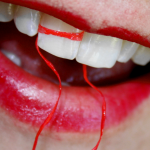Oral bacteria attack teeth in more ways than we knew. Bacteria that sequester phosphate in the ocean also do so in the mouth. Since phosphate is an integral component of enamel, its removal can weaken the teeth and make decay more likely. So keep flossing, folks!
teeth
Being toothless, known more formally as "complete edentulism," is a lot more common than you may think. Dentures and permanent false teeth cover up the fact that many people are walking around with phony chompers.
Dipping a toe into the waters of dental issues associated with scuba diving, a DDS-to-be wants to alert divers to the fact that taking the plunge can exacerbate problems with unhealthy teeth and loose fillings.
The researcher, a student in the University of Buffalo School of Dental Medicine, began a small survey of divers on a personal instinct that underwater conditions worsen existing dental problems.
The curiosity of the student, Vinisha Ranna, Bachelor of Dental Surgery, deepened after her own underwater excursion three years ago, when she experienced a "squeezing sensation in her teeth, a condition known as barodontalgia." And when Ms. Ranna subsequently found that there wasn't much clinical research previously done, she decided to dive into the topic herself.
In the world of 3-D printing, the latest big thing is teeth. But scientists aren't just making any old denture; they're producing antimicrobial teeth. Yet despite the amazing advances being made, there are still some major questions to be answered before these implants are viable. But the future is quickly approaching.
Periodontitis is a serious inflammation of the gum tissue that can result in loss of teeth and bone if not treated appropriately.


